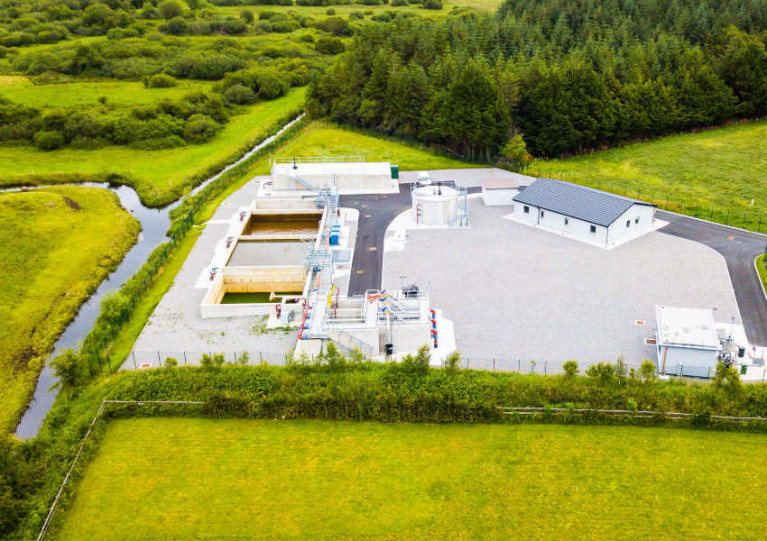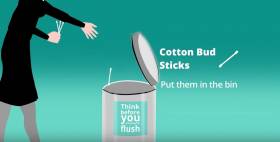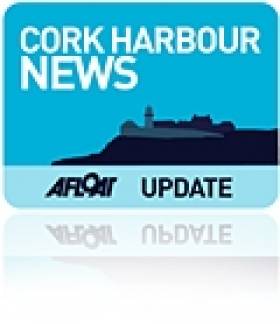Displaying items by tag: waste water
Waste water continues to harm the quality of many of Ireland’s rivers, estuaries, lakes and coastal waters, a report by the Environmental Protection Agency (EPA) says.
Over half of Ireland’s waste water discharges are not meeting EU standards set to protect the environment, it says.
Uisce Éireann “still does not have clear plans to prevent pollution at some of the most significantly impacted water bodies”, and “it is vital these are resolved through its new investment plan”, the EPA says.
It says that Uisce Éireann has committed to eliminating raw sewage discharges by 2025 from the majority of the 26 towns and villages which have no treatment.
Treatment plants must be operated and maintained properly to prevent impacts on the environment, it says.
The EPA report, entitled Urban Waste Water Treatment in 2022 and published today, shows that Uisce Éireann has made progress in stopping discharges of raw sewage over the past year, with the connection of six villages to new treatment plants in 2022.
“While it is encouraging to see continued progress in stopping the unacceptable practice of discharging raw sewage into our environment, waste water remains a significant pressure on Ireland’s water ways and is adversely impacting water quality,” EPA director Dr Tom Ryan says.
“The pace at which Uisce Éireann is delivering improvements needs to accelerate to prevent pollution and protect water quality,” he says.
“Uisce Éireann must take the opportunity of its new investment plan for 2025 to 2029 to deliver waste water infrastructure that meets the needs of our society and protects and improves our environment into the future,” he says.
“ The investment plan must prioritise resources to prevent pollution in the priority areas highlighted by the EPA,” he says.
The EPA says that 30 years after Ireland was required to bring provisions into force to comply with EU treatment standards set to protect the environment, less than half (45 per cent) of waste water is treated to these standards.
It says this is expected to improve significantly to over 90 per cent when the upgrade of Ireland’s largest treatment plant at Ringsend in Dublin is complete.
Noel Byrne, EPA Programme Manager, welcomed the fact that Uisce Éireann is currently building infrastructure at large urban areas, including Ringsend and Arklow, which are designed to treat waste water to a high standard.
“However, poor management practices at upgraded plants, such as Skibbereen and Courtmacsherry, caused inadequately treated sewage to discharge into the environment. This is not acceptable as these plants have sufficient treatment capacity,” he said.
“Uisce Éireann must implement effective maintenance programmes for existing infrastructure and improve its operation and management of treatment plants to prevent such failures in future,” he said.
The report is available on the EPA website.
Untreated Waste Water Impacts Our Fisheries Resource, Says Angling Agency
Inland Fisheries Ireland (IFI) says it welcomes the Environmental Protection Agency’s new report on urban waste water treatment in 2019.
Published this week, the EPA’s report criticises Irish Water over failure to meet pollution prevention standards at treatment facilities for 19 large towns and cities around Ireland.
Commenting on the report, IFI’s head of operations Dr Greg Forde said: “Continuing untreated discharges to waters around Ireland pose an unacceptable risk to the environment and public health.
“These untreated discharges are preventing the recovery of the biodiversity and ecology of significant rivers, estuaries and also where discharges go direct to the sea.
“It is unacceptable that many rivers are failing to recover due to persistent untreated discharges or overflow discharges where the capacity of treatment plants is inadequate to address growing populations.”
Dr Forde added that IFI is also concerned about the 35 predominantly coastal towns and villages without proper facilities for the treatment of sewage.
“It is not until 2022 that a significant number of these plants will come online,” he said.
As previously reported on Afloat.ie, IFI has launched updated guidelines on ‘Planning for Watercourses in the Urban Environment’ which outline an integrated watercourse protection strategy.
‘Think Before You Flush’ Initiative Adds More Communities
Clean Coasts partnered with Irish Water, for the second year running, launch the ‘Think Before You Flush’ Community Initiative. This programme aims to tackle the problems sanitary products can cause our waste water network and marine environment if flushed down the toilet.
As part of the Initiative, educational workshops for schools and businesses as well as community information events will be held to raise awareness of sewage related littering and change poor flushing behaviour.
In 2015, the ‘Think Before You Flush’ campaign focused on a community initiative in Galway City. Due to its great success this year 8 more communities from across the country are now actively involved. These communities will work with Clean Coasts and Irish Water to increase awareness of sewage related litter.
The ‘Think Before You Flush’ Communities for 2017 are:
1. Galway City
2. Balbriggan, Dublin
3. Ballycotton, Cork
4. Birr, Offaly
5. Wexford Town, Wexford
6. Dingle, Kerry
7. Bettystown, Meath
8. Virginia, Cavan
9. Tramore, Waterford
Sanitary items such as cotton bud sticks, face/baby wipes and those items we term as our ‘Dirty Dozen’ should not be flushed down the toilet, entering our waste water treatment network, which is unable to deal with this type of waste. In a study of over 1000 Irish people, a shocking 3 in 10 admitted to flushing such items down the toilet. Of these, 58% admitted to flushing baby wipes down the toilet, 40% facial wipes, 26% cotton bud sticks, 24% tampons and 21% cigarette butts. More than half of those who flush these items down the toilet did so simply due to a lack of knowledge. Sewage related litter is one of the largest categories of litter found on our beaches and is considered to be the most offensive.
90% of those surveyed agreed that seeing sewage related litter during a visit to the beach would disgust them while 84% of those surveyed agreed that if they knew that the items flushed down the toilet could end up being discharged into the ocean and could pollute our coastline and cause potential health risks they would not dispose of items in this way. This type of marine litter is totally preventable by simply changing our flushing behaviour.
Speaking about the expansion of the Think Before You Flush initiative to 9 Communities Sinead McCoy, Coastal Communities Manager, An Taisce said, “The Think Before You Flush campaign increases education and awareness about sewage related litter, enabling people to realise the consequence of their simple bathroom routine, and preventing items like cotton bud sticks washing up on Ireland’s spectacular beaches.”
Grainne Carey, Regional Information Specialist, Irish Water said, “By making small changes in our flushing behaviour we can prevent the harm caused by sewage related litter in the marine environment. Irish Water is investing significantly in improvements to wastewater infrastructure across the country and by partnering with Clean Coasts and local communities around the country we aim to develop an holistic approach to ensure our beaches and other receiving waters, are safe and protected.’'
#CorkHarbour - Untreated sewage is being discharged from "multiple" locations into Cork Harbour as residents await the development of new waste water treatment works.
As reported by Fine Gael Councillor Deirdre Forde, harbour officials have given confirmation that "there are still multiple untreated discharges to Cork Harbour.
"It is not simply a case of repairing a broken sewer to cease untreated discharges," the spokesperson added.
Waste water from Crosshaven, Carrigaline, Ringaskiddy, Passage West and Cobh, among other areas, is discharged through a number of outflows into the lower harbour - a region earmarked for a new drainage scheme project that's projected to be completed three years from now.
Harbour officials underlined that the level of the water table has no impact on the discharge, and that as the lower harbour is not designated for bathing there are no issues for swimmers.
Health Minister Speaks Out Against Fingal Sewerage 'Super Plant'
#NEWS UPDATE - The Minister for Health has raised concerns over a new water treatment 'super plant' planned for Fingal, amid fears that a malfunction could see huge amounts of raw sewerage pumped into the Irish Sea.
As reported in The Irish Times, Dr James Reilly echoed worries expressed by his north Dublin constituents and members of community group Reclaim Fingal Alliance, noting that the people of Skerries, Loughshinny and Rush are particularly "worried about the effects of the outfall pipe in their area".
The minister said that none of the nine sites being considered by Fingal County Council and Greater Dublin Drainage was suitable for sewerage treatment, and that any waste should be treated to "advanced levels" to make the outfall as clean as possible, thereby avoiding adverse impact on shellfish beds.
As many as 10,000 letters of objection have been lodged against the plan by campaigners including local farmers and environmentalists.
The Irish Times has more on the story HERE.
































































